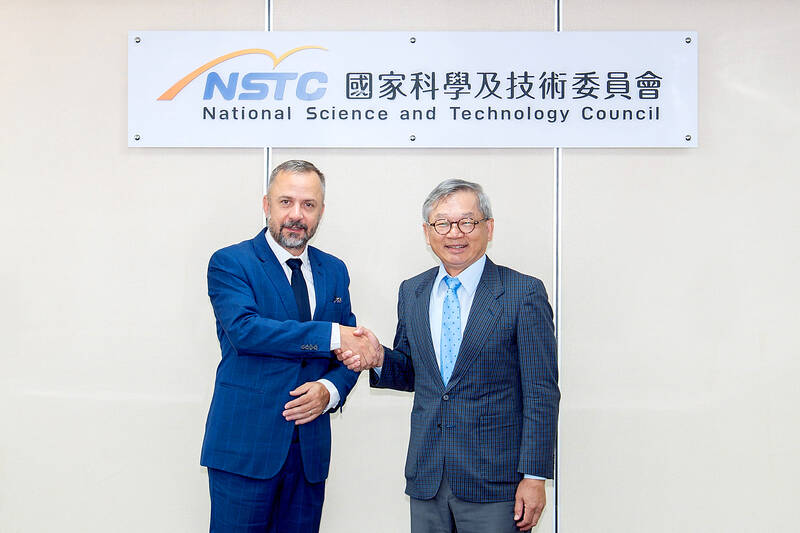Czech Minister for Science and Research Marek Zenisek is visiting Taiwan to launch the Czech Pavilion at the Semicon Taiwan trade show, which will be held from tomorrow to Friday in Taipei.
Zenisek will open the pavilion at the Taipei Nangang Exhibition Center, the Czech Economic and Cultural Office in Taipei said in a statement yesterday.
This year’s Czech Pavilion will feature representatives from business and academia in the semiconductor sector, the office said.

Photo courtesy of National Science and Technology Council
Exhibitors include ADVACAM, Brno University of Technology, Charles University, the Czech National Semiconductor Cluster, DCT Czech, HiLASE Centre, Meopta, SVCS Process Innovation, UNITES Systems, Vakuum Servis, and CzechInvest, it added.
The National Science and Technology Council (NSTC) yesterday confirmed that Zenisek had arrived and met with NSTC Minister Wu Cheng-wen (吳誠文) on Friday.
The two discussed ongoing cooperation in advanced chips, including the Advanced Chip Design and Research Center in Brno, the council said in a separate statement.
Zenisek and his delegation are also scheduled to visit Hsinchu Science Park (新竹科學園區) to learn from Taiwan’s experience in developing high-tech industry clusters.
Other stops include the Industrial Technology Research Institute, the National Synchrotron Radiation Research Center, the National Center for Instrumentation Research, and the Taiwan Semiconductor Research Institute, all located in Hsinchu, the council said.
Czech media reported that this marks the first visit to Taiwan by a minister-level official from a Central European country, despite the lack of formal diplomatic relations.

Taiwan’s rapidly aging population is fueling a sharp increase in homes occupied solely by elderly people, a trend that is reshaping the nation’s housing market and social fabric, real-estate brokers said yesterday. About 850,000 residences were occupied by elderly people in the first quarter, including 655,000 that housed only one resident, the Ministry of the Interior said. The figures have nearly doubled from a decade earlier, Great Home Realty Co (大家房屋) said, as people aged 65 and older now make up 20.8 percent of the population. “The so-called silver tsunami represents more than just a demographic shift — it could fundamentally redefine the

The US government on Wednesday sanctioned more than two dozen companies in China, Turkey and the United Arab Emirates, including offshoots of a US chip firm, accusing the businesses of providing illicit support to Iran’s military or proxies. The US Department of Commerce included two subsidiaries of US-based chip distributor Arrow Electronics Inc (艾睿電子) on its so-called entity list published on the federal register for facilitating purchases by Iran’s proxies of US tech. Arrow spokesman John Hourigan said that the subsidiaries have been operating in full compliance with US export control regulations and his company is discussing with the US Bureau of

Businesses across the global semiconductor supply chain are bracing themselves for disruptions from an escalating trade war, after China imposed curbs on rare earth mineral exports and the US responded with additional tariffs and restrictions on software sales to the Asian nation. China’s restrictions, the most targeted move yet to limit supplies of rare earth materials, represent the first major attempt by Beijing to exercise long-arm jurisdiction over foreign companies to target the semiconductor industry, threatening to stall the chips powering the artificial intelligence (AI) boom. They prompted US President Donald Trump on Friday to announce that he would impose an additional

Pegatron Corp (和碩), a key assembler of Apple Inc’s iPhones, on Thursday reported a 12.3 percent year-on-year decline in revenue for last quarter to NT$257.86 billion (US$8.44 billion), but it expects revenue to improve in the second half on traditional holiday demand. The fourth quarter is usually the peak season for its communications products, a company official said on condition of anonymity. As Apple released its new iPhone 17 series early last month, sales in the communications segment rose sequentially last month, the official said. Shipments to Apple have been stable and in line with earlier expectations, they said. Pegatron shipped 2.4 million notebook